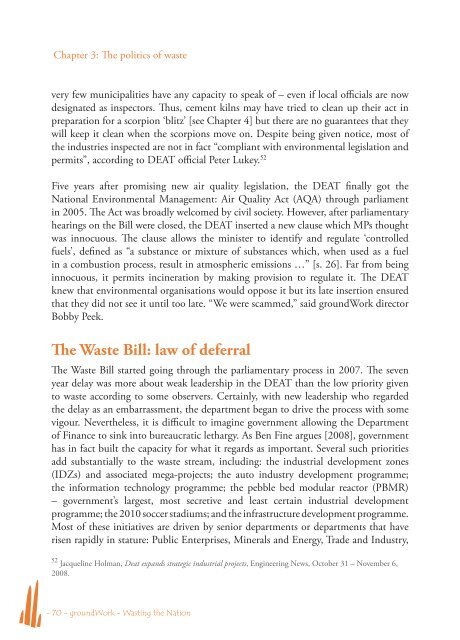Wasting the Nation.indd - Groundwork
Wasting the Nation.indd - Groundwork
Wasting the Nation.indd - Groundwork
You also want an ePaper? Increase the reach of your titles
YUMPU automatically turns print PDFs into web optimized ePapers that Google loves.
Chapter 3: The politics of wastevery few municipalities have any capacity to speak of – even if local officials are nowdesignated as inspectors. Thus, cement kilns may have tried to clean up <strong>the</strong>ir act inpreparation for a scorpion ‘blitz’ [see Chapter 4] but <strong>the</strong>re are no guarantees that <strong>the</strong>ywill keep it clean when <strong>the</strong> scorpions move on. Despite being given notice, most of<strong>the</strong> industries inspected are not in fact “compliant with environmental legislation andpermits”, according to DEAT official Peter Lukey. 52Five years after promising new air quality legislation, <strong>the</strong> DEAT finally got <strong>the</strong><strong>Nation</strong>al Environmental Management: Air Quality Act (AQA) through parliamentin 2005. The Act was broadly welcomed by civil society. However, after parliamentaryhearings on <strong>the</strong> Bill were closed, <strong>the</strong> DEAT inserted a new clause which MPs thoughtwas innocuous. The clause allows <strong>the</strong> minister to identify and regulate ‘controlledfuels’, defined as “a substance or mixture of substances which, when used as a fuelin a combustion process, result in atmospheric emissions …” [s. 26]. Far from beinginnocuous, it permits incineration by making provision to regulate it. The DEATknew that environmental organisations would oppose it but its late insertion ensuredthat <strong>the</strong>y did not see it until too late. “We were scammed,” said groundWork directorBobby Peek.The Waste Bill: law of deferralThe Waste Bill started going through <strong>the</strong> parliamentary process in 2007. The sevenyear delay was more about weak leadership in <strong>the</strong> DEAT than <strong>the</strong> low priority givento waste according to some observers. Certainly, with new leadership who regarded<strong>the</strong> delay as an embarrassment, <strong>the</strong> department began to drive <strong>the</strong> process with somevigour. Never<strong>the</strong>less, it is difficult to imagine government allowing <strong>the</strong> Departmentof Finance to sink into bureaucratic lethargy. As Ben Fine argues [2008], governmenthas in fact built <strong>the</strong> capacity for what it regards as important. Several such prioritiesadd substantially to <strong>the</strong> waste stream, including: <strong>the</strong> industrial development zones(IDZs) and associated mega-projects; <strong>the</strong> auto industry development programme;<strong>the</strong> information technology programme; <strong>the</strong> pebble bed modular reactor (PBMR)– government’s largest, most secretive and least certain industrial developmentprogramme; <strong>the</strong> 2010 soccer stadiums; and <strong>the</strong> infrastructure development programme.Most of <strong>the</strong>se initiatives are driven by senior departments or departments that haverisen rapidly in stature: Public Enterprises, Minerals and Energy, Trade and Industry,52 Jacqueline Holman, Deat expands strategic industrial projects, Engineering News, October 31 – November 6,2008.- 70 - groundWork - <strong>Wasting</strong> <strong>the</strong> <strong>Nation</strong>
















